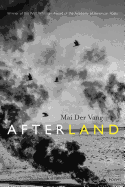
Mai Der Vang gives fiery, poetic voice to a secret war and a dispersed people in her powerful poetry collection Afterland.
A member of the Hmong diaspora community in the United States, and co-editor of How Do I Begin: A Hmong American Literary Anthology, the wildly imaginative and talented Vang sheds much-needed light on the U.S.'s clandestine military operation in Laos near the end of the Vietnam War, specifically on how the U.S. government recruited, then abandoned Hmong fighters. In these poems, Vang writes with the heartbreak of a refugee. The scenes of destruction and death and abandonment she describes become a tacit indictment of U.S. foreign policy: "What grief-song erupts/ when you see the last/ American plane take off/ distant above Long Cheng."
Vang digs beneath the chaos of war, searching the very conception of home for any familiar dimensions. To this end, her lines blaze with a distinct and vivid imagism. "Next came partitions of ice," reads the collection's eponymous poem. "Metallic roads./ Once, I was born in a bowl." While many of her images ring clear in direct, simplistic tones, Vang is not scared of the murkiness of the experimental. In several poems, the language leaps with surrealist impressions that at once deepen and obscure the poet's searching tenor. In "Light from a Burning Citadel," the sky "sleeps quilted in a militia of stars." In "Meditation of the Lioness," the "Violets are hatching volcanoes," and "Today's bees have swallowed/ The last milk of lanterns." These semantic fireworks color the collection's cooler, more settled truths. But it is the latter, the more subtle denouements of Afterland that linger in the mind like smoke, what Vang describes as "the sense/ of an answer." --Scott Neuffer, freelance journalist, poet and fiction author

